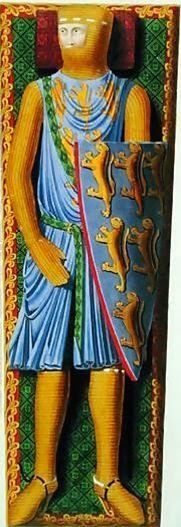Since Æthelred keeps getting mentioned here (most notably the past two days, due to the contested inheritance of the English throne between him and his half-brother, Edward the Martyr), I thought maybe we should mention a little more about him—or at least explain his not-very-flattering nickname.
When his father, King Edgar, died Æthelred was only about 10 years old. His half-brother, Edward, was a few years older. Edward was illegitimate, whereas Æthelred was the legitimate son of Edgar's last wife, Ælfthryth. Ælfthryth and others fought to have Æthelred succeed Edgar, but others fought for the older Edward, who wound up ruling for three years.
It is highly unlikely that the then-13-year-old Æthelred had anything to do with Edward's death on 18 March 978. Æthelred was crowned a month later.
One of the chief problems faced by Æthelred was attacks by the Danes. About a year after Æthelred became king, small groups of Danes began making raids on the English coast; these happened for a couple years. Then, after a six-year span of peace, a Danish incursion caused a battle between them and the nobles of Devon. England was able at this time to successfully defend itself, but there was an interesting side-effect of these raids, and that was the connection to Normandy.
Upon occasion, the Danes would leave England and cross the Channel to Normandy to give themselves time to rest and recuperate. The Normans ("North Men"), being of Scandinavian extraction originally, "took the side" of the Danes and started viewing England as a rival. Relations between England and Normandy started becoming hostile, so much so that Pope John XV decided to step in and broker a peace treaty between the two nations, in 991. A couple generations later, relations between England and Normandy would change radically, in
1066.
991 also saw the Battle of Maldon, in which the Danes did terrible damage to parts of England and the English nobility. After Maldon, Æthelred decided that England should pay the Danes to stay away. This started a dangerous precedent: paying off one group of Danes was no guarantee that another (or the same group) wouldn't come back and attack your shores in 997, 998, 999, 1000, and again in 1001. There were more payments, but they were followed by more invasions.
 |
This is a runestone in Sweden,
set up to commemorate a man
who received Danegeld three
times due to raids in England. |
Were the payments a good idea? This idea of
Danegeld ["Dane gold"] wasn't new: even King Alfred the Great had seen fit to use money to ensure peace. It was a way to get a marauder to go away and leave lives and crops and property intact. Still, it marred Æthelred's reputation, and may have led to his nickname.
"Unready" suggests to modern readers that he was not prepared for the problems that beset his reign. His Anglo-Saxon name and nickname were
Æthelred Unræd, which we translate today as "Æthelred the Unready." The
ræd element means "counsel" or "advice." The name
Æthelred Unræd would be a pun meaning "Noble advice, no advice." The "blame" (if that is what we should assign due to his nickname) may be imputed to his councilors, who gave him bad advice. It is the modern English understanding of the word "Unready" that makes us condemn him personally for not being prepared for what befell England while he was on the throne.






























